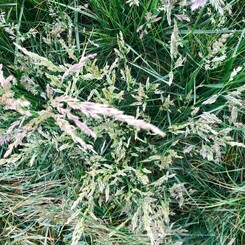Tall Fescue
Festuca arundinacea Sch.
Tall Fescue is a persistent grass deep-rooted perennial, with erect, unbranched tillers, and deep underground rhizomes. It can grow 2m tall at flowering. Tall Fescue is sown in permanent pastures for cattle and sheep grazing or conservation.
Pros
Tolerates wet and dry once established
drought tolerant species
Tolerates high temperatures
Stays green in a dry summer maintaining production when other species have ceased growing
Its extensive, deep-rooted system enables it to take up water during arid periods
Modern varieties have softer leaves and improved digestibility
Good winter growth in mild winters
New Zealand fescue seed does not contain any toxic endophyte
Grow in a wide range of soil types
Tolerant of wet/poorly drained soils
Productive best soil pH is 5.0 to 6.5 but can tolerate as low as pH 4.8,
Good year-round production of palatable feed
Does not frost as easily as phalaris and cocksfoot
Good winter growth in mild winters
The best time to sow is in autumn to early winter (March - June) when soil moisture is adequate. In high altitude, high rainfall areas, spring sowing (September) can be successful too.
New Zealand fescue seed does not contain toxic endophyte
Regeneration from seed is poor but does slowly spread vegetatively by short rhizomes.
Cons
Slow establishment
Heavy grazing, in late spring/summer, may reduce longevity in drier areas areas
Careful grazing management in the first year is essential to ensure proper plant population
Graze only when the root system is well developed, so it is not pulled out of the ground
For seed production, the paddock its needs to be locked up in mid-September to allow seed set.
Mixture suggestions
Grasses mixes, phalaris, ryegrass, cocksfoot
Legumes clovers, lotus, lucerne, if not sown with legumes, nitrogen fertiliser will be required
Suggested sow rate: 20-25 kg/ha alone 15-18 kg/ha in mixtures
When sown with vigorous grasses like perennial ryegrass reduce their sowing rate to 2kg/ha


